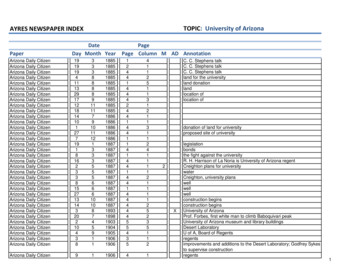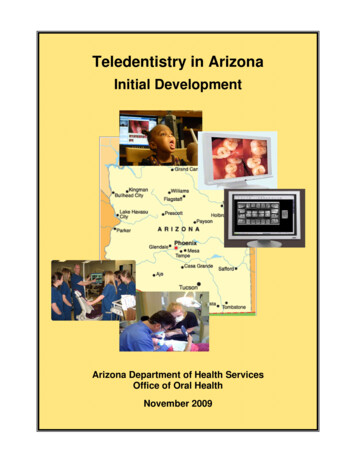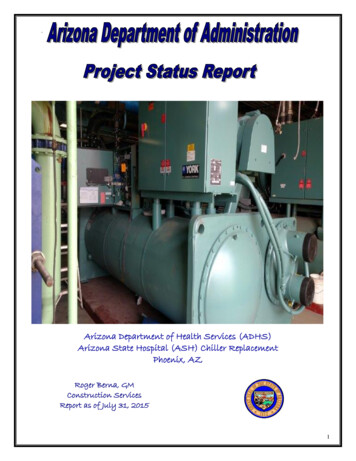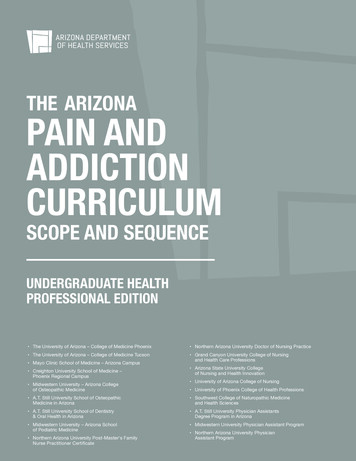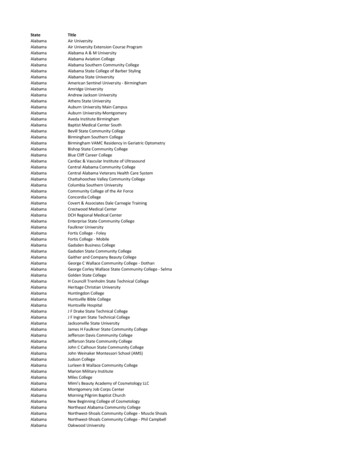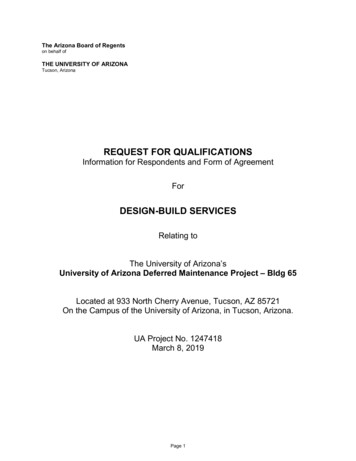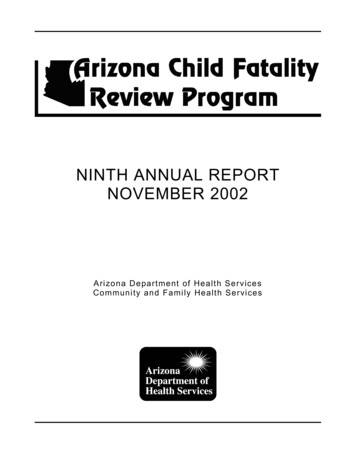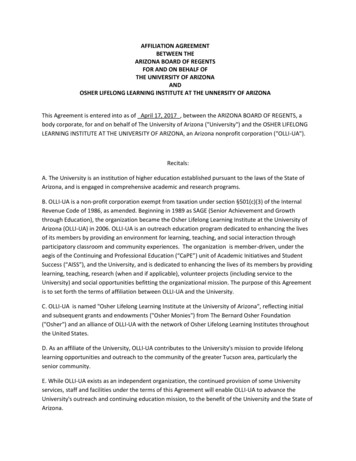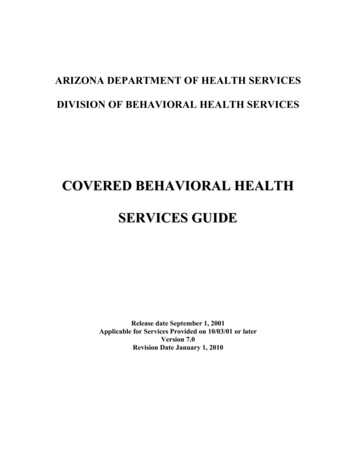
Transcription
ARIZONA DEPARTMENT OF HEALTH SERVICESDIVISION OF BEHAVIORAL HEALTH SERVICESCOVERED BEHAVIORAL HEALTHSERVICES GUIDERelease date September 1, 2001Applicable for Services Provided on 10/03/01 or laterVersion 7.0Revision Date January 1, 2010
TABLE OF CONTENTSI. INTRODUCTION . 4A.B.C.D.E.F.PURPOSE . . 4ORGANIZING PRINCIPLES . 6GENERAL GUIDELINES . 7PROVISION OF SERVICES . 7PROVIDER QUALIFICATIONS AND REGISTRATION . 10BILLING FOR SERVICES . 14II. SERVICE DESCRIPTIONS . 25II. A. TREATMENT SERVICES . 25II. A. 1. Behavioral Health Counseling and Therapy .26II. A. 2. Assessment, Evaluation and Screening Services .33II. A. 3. Other Professional .41II. B. REHABILITATION SERVICES . 46II. B. 1. Skills Training and Development and Psychosocial RehabilitationLiving Skills Training .47II. B. 2. Cognitive Rehabilitation.51II. B. 3. Behavioral Health Prevention/Promotion Education and MedicationTraining and Support Services (Health Promotion) .52II. B. 4. Psychoeducational Services and Ongoing Support to MaintainEmployment .54II. C. MEDICAL SERVICES . 59II. C. 1. Medication Services .60II. C. 2. Laboratory, Radiology and Medical Imaging.64II. C. 3. Medical Management .71II. C. 4. Electro-Convulsive Therapy.83II. D. SUPPORT SERVICES . 84II. D. 1. Case Management .85II. D. 2. Personal Care Services .91II. D. 3. Home Care Training Family (Family Support).94II. D. 4. Self-Help/Peer Services (Peer Support) .96II. D. 5. Home Care Training to Home Care Client.99II. D. 6. Unskilled Respite Care.102II. D. 7. Supported Housing .106II. D. 8. Sign Language or Oral Interpretive Services .108II. D. 9. Non-Medically Necessary Covered Services .110II. D. 10. Transportation .114II. E. CRISIS INTERVENTION SERVICES . 126II. E. 1. Crisis Intervention Services (Mobile).128II. E. 2. Crisis Intervention Services (Stabilization).131II. E. 3. Crisis Intervention (Telephone) .135II. F. INPATIENT SERVICES . 136II. F. 1. Hospital .144ADHS-DBHS Covered Behavioral Health Services GuideRevision Date: January 1, 2010 Version 7.0Effective Date: October 3, 20012
II. F. 2. Subacute Facility.147II. F. 3. Residential Treatment Center.149II. G. RESIDENTIAL SERVICES . 152II. G. 1. Behavioral Health Short-Term Residential (Level II), Without Roomand Board .153II. G. 2. Behavioral Health Long-Term Residential (Non-medical, Non-acute)Without Room and Board (Level III).155II. G. 3. Mental Health Services NOS (Room and Board) .156II. H. BEHAVIORAL HEALTH DAY PROGRAMS . 159II. H. 1. Supervised Behavioral Health Treatment and Day Programs.160II. H. 2. Therapeutic Behavioral Health Services and Day Programs .162II. H. 3. Community Psychiatric Supportive Treatment and Medical DayPrograms.165II. I. PREVENTION SERVICES . 168III. APPENDICES . 171A. RESERVED . 171B. REFERENCE TABLES. 172B-1.Reserved .172B-2.ADHS/DBHS Allowable Procedure Code Matrix .173B-3.HIPAA Code Crosswalk .174B-4.Reserved .175B-5.Billing Limitations Matrix.176B-6.Reserved .177B-7.Reserved .178B-8.Reserved .179B-9.Reserved .180B-10.Reserved .181C. RELATED INFORMATION RESOURCES . 182D. RESERVED . 183D.1.Reserved .183D.2.Reserved .184E. RESERVED . 185. 186F. RESERVEDG. RESERVED . 187ADHS-DBHS Covered Behavioral Health Services GuideRevision Date: January 1, 2010 Version 7.0Effective Date: October 3, 20013
I. IntroductionA.PurposeThe Arizona Department of Health Services – Division of Behavioral Health Services(ADHS/DBHS) has developed a comprehensive array of covered behavioral healthservices that will assist, support and encourage each eligible person to achieve andmaintain the highest possible level of health and self-sufficiency. The goals thatinfluenced how covered services were developed included:-Aligning services to support a person/family centered service delivery model.Focusing services to meet recovery goals.Increasing provider flexibility to better meet individual person/family needs.Eliminating barriers to service.Recognizing and including support services provided by non-licensed individualsand agencies.Streamlining service codes.Maximizing Title XIX/XXI funds.The impact of maximizing Title XIX/XXI funds is far-reaching. Not only will it bringmore federal dollars into the state to pay for services but it also will free up non-TitleXIX/XXI dollars to provide services to non-Title XIX/XXI eligible persons and toprovide non-Title XIX/XXI services to all eligible persons. To maximize Title XIX/XXIfunds, it is critical that Tribal and Regional Behavioral Health (T/RBHAs) and theirsubcontractors also maximize their efforts to assure that all Title XIX/XXI eligibleindividuals are enrolled in AHCCCS.In addition, maximization of Title XIX/XXI funds is dependent on claims beingsubmitted correctly. There are three critical components that must be in place tosuccessfully bill for Title XIX/XXI reimbursement:-The person receiving the service must be Title XIX/XXI eligible.The individual or agency submitting the bill must be an AHCCCS registeredprovider.The service must be a recognized Title XIX/XXI covered behavioral healthservice and be billed using the appropriate billing code.These individual components are addressed in depth in this service guide.In order to maintain the integrity of the ADHS/DBHS Covered Behavioral HealthServices Guide, a consistent process for requesting and considering changes has beendeveloped. Requested changes, including changes to the services, the service codes, theprovider types, and the listed rates, will be implemented on a quarterly basis unless theDeputy Director authorizes a change to take effect immediately. Changes that must takeeffect immediately will be communicated to T/RBHAs through Edit Alerts. In addition,ADHS-DBHS Covered Behavioral Health Services GuideRevision Date: January 1, 2010 Version 7.0Effective Date: October 3, 20014
ADHS/DBHS provides monthly newsletters to ensure effective communication regardingchanges (see http://www.azdhs.gov/bhs/tidbits.htm).A request for change to the ADHS/DBHS Covered Behavioral Health Services Guidemay be made by representatives of ADHS/DBHS, the T/RBHAs or their contractors,persons and/or their families, advocates or other state agencies/stakeholders. Writtenrequests should be forwarded to the ADHS/DBHS Policy Office for consideration. Thefinal disposition of any written request for change to the ADHS/DBHS CoveredBehavioral Health Services Guide will be communicated back to the requestor.ADHS-DBHS Covered Behavioral Health Services GuideRevision Date: January 1, 2010 Version 7.0Effective Date: October 3, 20015
B.Organizing PrinciplesADHS/DBHS has organized its array of covered behavioral health services into acontinuum of service domains for the purpose of promoting clarity of understandingthrough the consistent use of common terms that reach across populations. Theindividual domains are:-Treatment ServicesRehabilitation ServicesMedical ServicesSupport ServicesCrisis Intervention ServicesInpatient ServicesResidential ServicesBehavioral Health Day ProgramsPrevention ServicesThis continuum not only applies to delivering services but also serves as the frameworkfor program management and reporting.Within each domain, specific services are defined and described including identificationof specific provider qualifications/service standards and limitations. Additionally, codespecific information (both service descriptions and billing parameters) is provided.Although comprehensive information is described in this guide regarding ADHS/DBHSallowable service codes; providers may want to reference the Healthcare ProcedureCoding System (HCPCS) Manual for additional information.General information is also provided about the use of national UB04 revenue codes,national drug codes and CPT codes; however, detailed procedure code descriptions forthese codes covered by ADHS/DBHS should be referenced in the following manuals:-UB04 ManualFirst Data Bank (i.e., pharmacy information)Physicians’ Current Procedural Terminology (CPT) ManualADHS-DBHS Covered Behavioral Health Services GuideRevision Date: January 1, 2010 Version 7.0Effective Date: October 3, 20016
C.General GuidelinesIn order to appropriately utilize the array of covered services to improve a person’sfunctioning and to be able to effectively bill for those services provided, there are anumber of general principles/guidelines that are important to understand. While SectionII discusses the delivery of specific services, there are overarching themes that apply tothe delivery of all services, which must be understood. This discussion is divided intothree subsections:-Provision of ServicesProvider Qualifications and RegistrationBilling for ServicesThese guidelines provide an overview of key covered services components. Moredetailed descriptions and requirements can be found in ADHS/DBHS policies.D.Provision of Services1.Eligibility and Funding SourceFactors that may impact the provision and availability of behavioral health servicesare the eligibility status of the person being served as well as the funding sourceand fund availability. ADHS/DBHS is responsible for providing services topersons with behavioral health needs including:-Title XIX eligible persons enrolled with Arizona Health Care CostContainment System (AHCCCS) acute care health plans or Indian HealthServices (IHS).Title XIX eligible persons enrolled with Arizona Long Term Care System(ALTCS) - Department of Economic Security – Division of DevelopmentalDisability (DES-DDD).Title XXI (Kids Care) eligible children and parents enrolled with AHCCCSacute care health plans.Non-Title XIX/XXI eligible persons.Depending on a person’s eligibility status, funding can impact benefit coverage.While the covered service array is the same for Title XIX/XXI and non-TitleXIX/XXI eligible persons, services for non-Title XIX/XXI persons must be paidfor with non-Title XIX/XXI monies. In addition, non-Title XIX/XXI funds areused to pay for services (e.g. flex fund services and room and board), not coveredby Title XIX/XXI, to both Title XIX/XXI and non-Title XIX/XXI eligible persons.The ability to provide these services may be limited by the amount of state fundsthat are appropriated annually or by the availability of other non-Title XIX/XXIfunds. Since non-Title XIX/XXI funds are limited, ADHS/DBHS requires they beprioritized according to procedures set forth in ADHS/DBHS policy.ADHS-DBHS Covered Behavioral Health Services GuideRevision Date: January 1, 2010 Version 7.0Effective Date: October 3, 20017
Lastly, some coverage restrictions may apply depending on the funding source.For example, the Federal Substance Abuse Prevention and Treatment PerformancePartnership Block Grant designates both the type of service to be funded as well asthe priority populations to be served.2.EnrollmentAll persons who receive behavioral health services whether on short term (one ortwo services) or long term basis must be enrolled in the ADHS/DBHS system.Those instances when services can be provided to non-enrolled individuals include:-Emergency/crisis intervention services provided to a non-registered person. *Case management services involving outreach to individuals and families.Prevention services provided to groups of individuals and/or in communitysettings.HIV related services that are provided confidentially.When encounters are submitted for “unidentified” individuals receiving crisis orcase management services, the service provider should use the applicable pseudoID numbers (e.g., NR010XXMO) that are assigned to each RBHA. See ProviderManual Attachment 6.1.1, Pseudo Identification Numbers. Encounters are notsubmitted for prevention services.* Title XIX/XXI individuals must be enrolled effective no later than the date offirst contact.3.Family MembersFor purposes of service coverage and this guide, family is defined as:(1) “The primary care giving unit and is inclusive of the wide diversity ofprimary care giving units in our culture. Family is a biological, adoptive or selfcreated unit of people residing together consisting of adult(s) and/or child(ren) withadult(s) performing duties of parenthood for the child(ren). Persons within this unitshare bonds, culture, practices and a significant relationship. Biological parents,siblings and others with significant attachment to the individual living outside thehome are included in the definition of family.”In many instances it is important to provide behavioral health services to the familymember as well as the person seeking services. For example, family members mayneed help with parenting skills, education regarding the nature and management ofthe mental health disorder, or relief from care giving. Many of the services listed inthe service array can be provided to family members, regardless of their enrollmentor entitlement status as long as the enrolled person’s treatment record reflects thatthe provision of these services is aimed at accomplishing the service plan goals (i.e.,ADHS-DBHS Covered Behavioral Health Services GuideRevision Date: January 1, 2010 Version 7.0Effective Date: October 3, 20018
they show a direct, positive effect on the individual). This also means that theenrolled person does not have to be present when the services are being provided tofamily members.For situations in which a family member is determined to have extensive behavioralhealth needs, (e.g., substance abusing parent) the family member her/himself shouldbe enrolled in the system. It is recognized that the ability to provide services tonon-Title XIX/XXI eligible family members may be limited depending on theavailability of funds.ADHS-DBHS Covered Behavioral Health Services GuideRevision Date: January 1, 2010 Version 7.0Effective Date: October 3, 20019
E.Provider Qualifications and RegistrationAny person or agency may participate as an ADHS/DBHS provider if the person oragency is qualified to render a covered service and meets the ADHS/DBHS requirementsfor provider participation. These requirements include:-Obtaining any necessary license or certification (including CMS certificationfor tribal providers).Meeting provider standards as set forth in this service guide for the coveredservice, which the provider wishes to deliver.Registering with AHCCCS as an AHCCCS provider or in rare instances withADHS/DBHS as a DBHS-only provider.Obtaining an ADHS/DBHS provider ID as directed by ADHS/DBHS.Contracting with the appropriate Regional Behavioral Health Authority(RBHA) or Tribal Regional Behavioral Health Authority (TRBHA).For some services, individual providers both provide the service as well as are required toregister and bill for the service. In other instances, individual providers are required to beaffiliated with an agency that in turn is responsible for billing for the service. Individualprovider qualification and provider billing requirements are discussed for each service inSection II of this guide.1.AHCCCS Registered ProvidersFor most covered behavioral health services, a provider must be registered with theAHCCCS Administration as a Title XIX/XXI provider regardless of whether theservice is provided to a Title XIX/XXI or a non-Title XIX/XXI eligible individual.(See discussion below regarding billing provider type).Category of ServiceFor all provider types there are mandatory and occasionally optional AHCCCSCategories of Services (COS). In addition to the provider type, the COS willdetermine the specific services for which the provider can bill. For purposes ofbehavioral health, the following COSs are relevant:01 – Medicine09 – Pharmacy10 – Inpatient Hospital12 – Pathology & Laboratory13 – Radiology14 – Emergency Transportation16 – Outpatient Facility Fees26 – Respite Care Services31 – Non-EmergencyTransportation39 – Habilitation47 – Mental Health ServicesIn order to qualify for some of these COSs the providers may have to meetadditional licensing/certification requirements. It is important for providers whenADHS-DBHS Covered Behavioral Health Services GuideRevision Date: January 1, 2010 Version 7.0Effective Date: October 3, 200110
registering to make sure they qualify and register for the necessary COS that willallow them to bill the desired service codes. Providers should reference AppendixB.2, ADHS/DBHS Allowable Procedure Code Matrix to identify the applicableCOS associated with each procedure code.Additional information as well as registration materials may be obtained by callingthe AHCCCS Provider Registration Unit at:Phoenix area: (602) 417-7670 (Option 5)In-State: 1-800-794-6862 (Option 5)Out of state: 1-800-523-0231 (Ext. 77670)AHCCCS Provider Registration materials are also available on the AHCCCS Website at www.ahcccs.state.az.us.2.DBHS-Only Registered ProvidersIn rare instances, providers may register with ADHS/DBHS as a DBHS-onlyprovider. This should occur only when a provider:-Has a contract with a T/RBHA;Is not able to qualify under any of the existing AHCCCS provider types thatare allowed to bill for the particular service being provided;Meets the qualification of one of the DBHS-only provider types; andWill be billing Non-Title XIX/XIX reimbursable codes only (e.g., H0043Supported Housing)Currently there are two (2) DBHS-only provider types. These DBHS-only providertypes include:-S2 – OtherS3 – Tribal Traditional Service PractitionerAdditional information, including registration materials, may be obtained by callingthe ADHS/DBHS (602) 364-4558 and asking to be directed to the personresponsible for overseeing the DBHS-only provider registration process.ADHS-DBHS Covered Behavioral Health Services GuideRevision Date: January 1, 2010 Version 7.0Effective Date: October 3, 200111
3.Tribal Provider Certification and RegistrationIn addition to registering with AHCCCS and in lieu of OBHL licensure, tribalproviders must be certified by the Center for Medicare and Medicaid Services(CMS) to provide services. Tribal providers must submit completed certificationforms indicating that the provider meets the same standards as other comparableproviders. AHCCCS will review the provider application and submit the CMScertification to CMS for approval.Additional information regarding tribal provider certification and registration canbe found in the AHCCCS IHS/Tribal Provider Billing Manual.4.Individuals Employed by or Under Contract with Licensed OBHLAgenciesFor licensed OBHL residential and outpatient clinics, there are three (3) types ofindividual providers who are not allowed to bill independently for services. Theseinclude:-Behavioral Health Professionals: Only a subset of behavioral healthprofessionals as defined in 9 A.A.C. 20 must be affiliated with an OutpatientClinic. This primarily includes social workers, counselors, marriage andfamily therapists, and substance abuse counselors who are licensed by theArizona Board of Behavioral Health Examiners pursuant to ARS Title 32,Chapter 33 or other recognized licensing boards and who either are notallowed to practice independently or do not meet the AHCCCS registrationcriteria as an independent biller (Provider Types 08, 11, 12, 18, 19, 31, 85,86, 87 and A4).-Behavioral Health Technicians as defined in 9 A.A.C. 20.-Behavioral Health Paraprofessionals as defined in 9 A.A.C. 20.5.Community Service AgenciesNon-OBHL licensed agencies can become a community service agency andprovide rehabilitation and support services. To provide these services, individualproviders have to meet certain qualifications and have to be associated with acommunity service agency.In addition to meeting specific provider requirements set forth in this guide for theservices they will be providing, these providers will need to submit certaindocumentation as part of their registration packet. A description of documentationrequirements is described in ADHS/DBHS Policy MI 5.2, Community ServiceAgencies-Title XIX Certification available on line athttp://www.azdhs.gov/bhs/policy.htm.ADHS-DBHS Covered Behavioral Health Services GuideRevision Date: January 1, 2010 Version 7.0Effective Date: October 3, 200112
This Page Intentionally Left BlankADHS-DBHS Covered Behavioral Health Services GuideRevision Date: January 1, 2010 Version 7.0Effective Date: October 3, 200113
6.Habilitation ProvidersA Habilitation Provider is a home and community based service provider certifiedthrough the Department of Economic Security/Division of DevelopmentalDisabilities (DES/DDD) and registered with the AHCCCS Administration.T/RBHAs must ensure adequate liability insurance before contracting with aHabilitation Provider, regardless if the provider is a DES certified individual oragency.Prior to the delivery of behavioral health services, the Habilitation Provider mustreceive an orientation to the unique characteristics and specific needs of the eligibleperson under their care. Habilitation Providers must be informed regarding whomto contact in an emergency, significant events or other incidents involving theeligible person. The clinical liaison or designee is responsible for the timely reviewand resolution of any known issues or complaints involving the eligible person anda Habilitation Provider.Effective April 1, 2003, AHCCCS added COS 47 to certain Habilitation Providers(Provider Type 39). Those providers who registered with AHCCCS on or afterApril 1, 2003 and who are ADES/HCBS certified to provide habilitation serviceswill automatically be given COS 47 in their profile. Only the following COS 47 1and COS 26 codes will be available to Provider Type 39:H2014 – Skills training and developmentH2014 HQ – Skills training and development, groupS5150 and S5151 – Unskilled respite (COS 26)T1019 and T1020 – Personal care servicesH2017 – Psychosocial rehabilitation serviceS5110 – Home care training, familyThe child and family team or the eligible person’s treatment team as part of theservice planning process must periodically review services provided by HabilitationProviders. Further, services provided by Habilitation Providers must bedocumented per ADHS/DBHS policy.F.Billing for ServicesIn addition to the general principles related to the provision of services, there are alsogeneral guidelines, which must be followed in billing for covered behavioral healthservices to ensure that services will be reimbursed, and/or the encounters accepted.1This change affects Provider Type 39 providers who become registered with AHCCCS from April 1,2003 and onward. Provider Type 39 providers who registered with AHCCCS before April 1, 2003 andwish to bill the above codes must contact provider registration and request COS 47 to be added to theirexisting profile. Only providers who have ADES/HCBS certification to provide habilitation qualify for theCOS 47.ADHS-DBHS Covered Behavioral Health Services GuideRevision Date: January 1, 2010 Version 7.0Effective Date: October 3, 200114
1.Service CodesThere are two types of codes that can be billed for services provided:a.AHCCCS Allowable Codes that may be paid for with Title XIX/XXI fundsand/or non-XIX/XXI funds depending on the person’s eligibility status; andCodes that are not allowable under AHCCCS and can only be paid for withnon-Title XIX/XXI funds.AHCCCS Allowable CodesAHCCCS allowable codes are to be used to bill for services provided to any personeligible to receive services through ADHS/DBHS, regardless of his/her eligibilitystatus (e.g., Title XIX/XXI, non-Title XIX/XXI). To bill AHCCCS allowablecodes the provider must be an AHCCCS registered provider.AHCCCS allowable codes can be further subdivided into the following categories:(1.)CPT- Physicians’ Current Procedural Terminology (CPT) contains nationallyrecognized service codes. For more information regarding these codes see thePhysicians’ Current Procedural Terminology (CPT) Manual, which contains asystematic listing and coding of procedures and services, such as surgical,diagnostic or therapeutic procedures.(2.)HCPCSHealthcare Procedure Coding System (HCPCS) contains nationally recognizedservice codes. For more information regarding these codes see the HealthcareProcedure Coding System (HCPCS) Manual, which is a systematic listing andcoding for reporting the provision of supplies, materials, injections and certainnon-physician services and procedures. A subset of the HCPCS codes are notTitle XIX/XXI reimbursable; these are identified in Appendix B.2,ADHS/DBHS Allowable Procedure Code Matrix.(3.)National Drug Codes (NDC)These nationally recognized drug codes are used to bill for prescription drugs.Information regarding these pharmacy-related codes can be found in the FirstData Bank.(4.)UB04 Revenue CodesADHS-DBHS Covered Behavioral Health Services GuideRevision Date: January 1, 2010 Version 7.0Effective Date: October 3, 200115
These nationally recognized revenue codes are used to bill for all inpatient andcertai
- Treatment Services - Rehabilitation Services - Medical Services - Support Services - Crisis Intervention Services - Inpatient Services - Residential Services - Behavioral Health Day Programs - Prevention Services This continuum not only applies to delivering services but also serves as the framework for program management and reporting.
